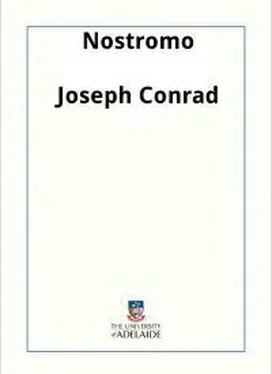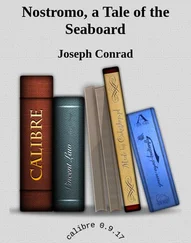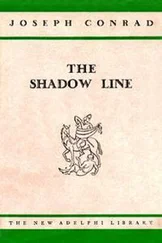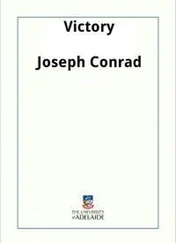Джозеф Конрад - Nostromo - A Tale of the Seaboard
Здесь есть возможность читать онлайн «Джозеф Конрад - Nostromo - A Tale of the Seaboard» весь текст электронной книги совершенно бесплатно (целиком полную версию без сокращений). В некоторых случаях можно слушать аудио, скачать через торрент в формате fb2 и присутствует краткое содержание. Год выпуска: 2006, Жанр: Классическая проза, на английском языке. Описание произведения, (предисловие) а так же отзывы посетителей доступны на портале библиотеки ЛибКат.
- Название:Nostromo: A Tale of the Seaboard
- Автор:
- Жанр:
- Год:2006
- ISBN:нет данных
- Рейтинг книги:4 / 5. Голосов: 1
-
Избранное:Добавить в избранное
- Отзывы:
-
Ваша оценка:
- 80
- 1
- 2
- 3
- 4
- 5
Nostromo: A Tale of the Seaboard: краткое содержание, описание и аннотация
Предлагаем к чтению аннотацию, описание, краткое содержание или предисловие (зависит от того, что написал сам автор книги «Nostromo: A Tale of the Seaboard»). Если вы не нашли необходимую информацию о книге — напишите в комментариях, мы постараемся отыскать её.
Nostromo: A Tale of the Seaboard — читать онлайн бесплатно полную книгу (весь текст) целиком
Ниже представлен текст книги, разбитый по страницам. Система сохранения места последней прочитанной страницы, позволяет с удобством читать онлайн бесплатно книгу «Nostromo: A Tale of the Seaboard», без необходимости каждый раз заново искать на чём Вы остановились. Поставьте закладку, и сможете в любой момент перейти на страницу, на которой закончили чтение.
Интервал:
Закладка:
“You know that I never approved of the silver being sent away,” the doctor began at once, as a preliminary to the narrative of his night’s adventures in association with Captain Mitchell, the engineer-in-chief, and old Viola, at Sotillo’s headquarters. To the doctor, with his special conception of this political crisis, the removal of the silver had seemed an irrational and ill-omened measure. It was as if a general were sending the best part of his troops away on the eve of battle upon some recondite pretext. The whole lot of ingots might have been concealed somewhere where they could have been got at for the purpose of staving off the dangers which were menacing the security of the Gould Concession. The Administrador had acted as if the immense and powerful prosperity of the mine had been founded on methods of probity, on the sense of usefulness. And it was nothing of the kind. The method followed had been the only one possible. The Gould Concession had ransomed its way through all those years. It was a nauseous process. He quite understood that Charles Gould had got sick of it and had left the old path to back up that hopeless attempt at reform. The doctor did not believe in the reform of Costaguana. And now the mine was back again in its old path, with the disadvantage that henceforth it had to deal not only with the greed provoked by its wealth, but with the resentment awakened by the attempt to free itself from its bondage to moral corruption. That was the penalty of failure. What made him uneasy was that Charles Gould seemed to him to have weakened at the decisive moment when a frank return to the old methods was the only chance. Listening to Decoud’s wild scheme had been a weakness.
The doctor flung up his arms, exclaiming, “Decoud! Decoud!” He hobbled about the room with slight, angry laughs. Many years ago both his ankles had been seriously damaged in the course of a certain investigation conducted in the castle of Sta. Marta by a commission composed of military men. Their nomination had been signified to them unexpectedly at the dead of night, with scowling brow, flashing eyes, and in a tempestuous voice, by Guzman Bento. The old tyrant, maddened by one of his sudden accesses of suspicion, mingled spluttering appeals to their fidelity with imprecations and horrible menaces. The cells and casements of the castle on the hill had been already filled with prisoners. The commission was charged now with the task of discovering the iniquitous conspiracy against the Citizen-Saviour of his country.
Their dread of the raving tyrant translated itself into a hasty ferocity of procedure. The Citizen-Saviour was not accustomed to wait. A conspiracy had to be discovered. The courtyards of the castle resounded with the clanking of leg-irons, sounds of blows, yells of pain; and the commission of high officers laboured feverishly, concealing their distress and apprehensions from each other, and especially from their secretary, Father Beron, an army chaplain, at that time very much in the confidence of the Citizen-Saviour. That priest was a big round-shouldered man, with an unclean-looking, overgrown tonsure on the top of his flat head, of a dingy, yellow complexion, softly fat, with greasy stains all down the front of his lieutenant’s uniform, and a small cross embroidered in white cotton on his left breast. He had a heavy nose and a pendant lip. Dr. Monygham remembered him still. He remembered him against all the force of his will striving its utmost to forget. Father Beron had been adjoined to the commission by Guzman Bento expressly for the purpose that his enlightened zeal should assist them in their labours. Dr. Monygham could by no manner of means forget the zeal of Father Beron, or his face, or the pitiless, monotonous voice in which he pronounced the words, “Will you confess now?”
This memory did not make him shudder, but it had made of him what he was in the eyes of respectable people, a man careless of common decencies, something between a clever vagabond and a disreputable doctor. But not all respectable people would have had the necessary delicacy of sentiment to understand with what trouble of mind and accuracy of vision Dr. Monygham, medical officer of the San Tome mine, remembered Father Beron, army chaplain, and once a secretary of a military commission. After all these years Dr. Monygham, in his rooms at the end of the hospital building in the San Tome gorge, remembered Father Beron as distinctly as ever. He remembered that priest at night, sometimes, in his sleep. On such nights the doctor waited for daylight with a candle lighted, and walking the whole length of his rooms to and fro, staring down at his bare feet, his arms hugging his sides tightly. He would dream of Father Beron sitting at the end of a long black table, behind which, in a row, appeared the heads, shoulders, and epaulettes of the military members, nibbling the feather of a quill pen, and listening with weary and impatient scorn to the protestations of some prisoner calling heaven to witness of his innocence, till he burst out, “What’s the use of wasting time over that miserable nonsense! Let me take him outside for a while.” And Father Beron would go outside after the clanking prisoner, led away between two soldiers. Such interludes happened on many days, many times, with many prisoners. When the prisoner returned he was ready to make a full confession, Father Beron would declare, leaning forward with that dull, surfeited look which can be seen in the eyes of gluttonous persons after a heavy meal.
The priest’s inquisitorial instincts suffered but little from the want of classical apparatus of the Inquisition. At no time of the world’s history have men been at a loss how to inflict mental and bodily anguish upon their fellow-creatures. This aptitude came to them in the growing complexity of their passions and the early refinement of their ingenuity. But it may safely be said that primeval man did not go to the trouble of inventing tortures. He was indolent and pure of heart. He brained his neighbour ferociously with a stone axe from necessity and without malice. The stupidest mind may invent a rankling phrase or brand the innocent with a cruel aspersion. A piece of string and a ramrod; a few muskets in combination with a length of hide rope; or even a simple mallet of heavy, hard wood applied with a swing to human fingers or to the joints of a human body is enough for the infliction of the most exquisite torture. The doctor had been a very stubborn prisoner, and, as a natural consequence of that “bad disposition” (so Father Beron called it), his subjugation had been very crushing and very complete. That is why the limp in his walk, the twist of his shoulders, the scars on his cheeks were so pronounced. His confessions, when they came at last, were very complete, too. Sometimes on the nights when he walked the floor, he wondered, grinding his teeth with shame and rage, at the fertility of his imagination when stimulated by a sort of pain which makes truth, honour, selfrespect, and life itself matters of little moment.
And he could not forget Father Beron with his monotonous phrase, “Will you confess now?” reaching him in an awful iteration and lucidity of meaning through the delirious incoherence of unbearable pain. He could not forget. But that was not the worst. Had he met Father Beron in the street after all these years Dr. Monygham was sure he would have quailed before him. This contingency was not to be feared now. Father Beron was dead; but the sickening certitude prevented Dr. Monygham from looking anybody in the face.
Dr. Monygham had become, in a manner, the slave of a ghost. It was obviously impossible to take his knowledge of Father Beron home to Europe. When making his extorted confessions to the Military Board, Dr. Monygham was not seeking to avoid death. He longed for it. Sitting half-naked for hours on the wet earth of his prison, and so motionless that the spiders, his companions, attached their webs to his matted hair, he consoled the misery of his soul with acute reasonings that he had confessed to crimes enough for a sentence of death—that they had gone too far with him to let him live to tell the tale.
Читать дальшеИнтервал:
Закладка:
Похожие книги на «Nostromo: A Tale of the Seaboard»
Представляем Вашему вниманию похожие книги на «Nostromo: A Tale of the Seaboard» списком для выбора. Мы отобрали схожую по названию и смыслу литературу в надежде предоставить читателям больше вариантов отыскать новые, интересные, ещё непрочитанные произведения.
Обсуждение, отзывы о книге «Nostromo: A Tale of the Seaboard» и просто собственные мнения читателей. Оставьте ваши комментарии, напишите, что Вы думаете о произведении, его смысле или главных героях. Укажите что конкретно понравилось, а что нет, и почему Вы так считаете.












